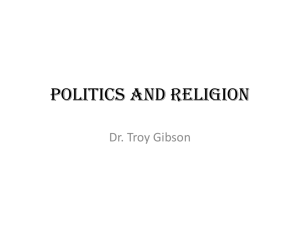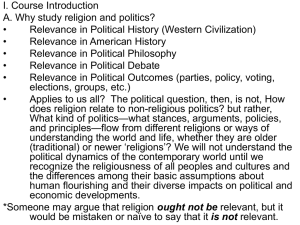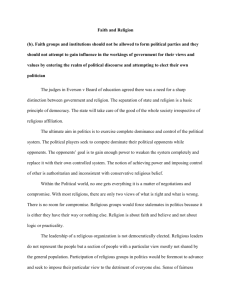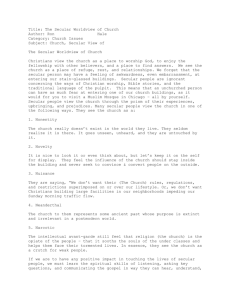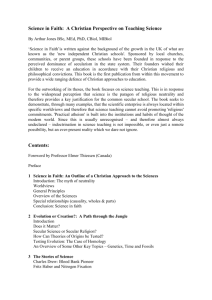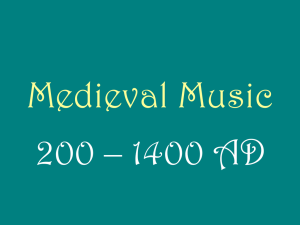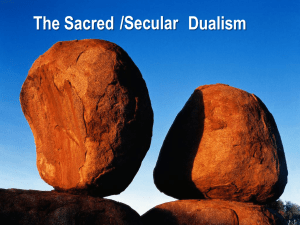Politics and Religion
advertisement
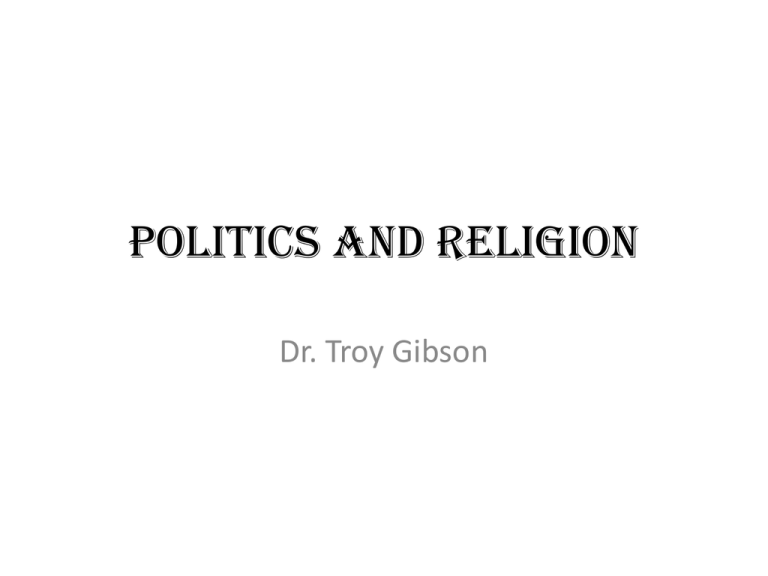
Politics and Religion Dr. Troy Gibson I. Course Introduction A. Why study religion and politics? • Relevance in Political History (Western Civilization) • Relevance in American History • Relevance in Political Philosophy • Relevance in Political Debate • Relevance in Political Outcomes (parties, policy, voting, elections, groups, etc.) • Applies to us all? The political question, then, is not, How does religion relate to non-religious politics? but rather, What kind of politics—what stances, arguments, policies, and principles—flow from different religions or ways of understanding the world and life, whether they are older (traditional) or newer ‘religions’? We will not understand the political dynamics of the contemporary world until we recognize the religiousness of all peoples and cultures and the differences among their basic assumptions about human flourishing and their diverse impacts on political and economic development. *Someone may argue that religion ought not be relevant, but it would be mistaken or naïve to say that it is not relevant. B. Religion IN Politics in America (comparatively speaking). Neither Iran, England, France, or Germany. No homework on Wednesday nights; government offices closed on Sundays; out on Easter and Christmas. Peter Berger: “If India is the most religious country on our planet, and Sweden is the least religious, America is a land of Indians ruled by Swedes.” Instead, we have a sort of “permissive establishment” of religion here, where the major religion is accommodated in public life (not oppressive, not prescriptive, not entirely secular). The Concept of Separation of Church and state exists in virtually every western democracy; but vastly different meanings and applications. C. How will we study R&P? Where do we limit the study? Course will focus mostly on most dominant religious groups in America, movements, events, trends, in American political history and behavior. II. But What about the Secularization thesis? A. Definition: Religious belief and practice is (and ought to be) decreasing in relevance & acceptance as human progress is advanced through modernization and globalization. B. Evidence – Religion is ‘safe’ and irrelevant • Decline of religiosity (in Europe, at least) • Rise of dualism (division of all things into sacred/secular airtight categories) and the privatization/secularization of Christianity (America); paradigm shift; Christian and religious categories, once taken for granted, no longer welcome as lenses through which we must interpret the world; from 1950-today America moved from dualism towards postmodernism. (Example: Bible-theft). – How pervasive? Can you imagine a research program or department who’s whole mission was to examine the phenomenon of secularism? • Responses to naturalism by Christians, a new protestantism: growth in subjective faith, growth in experiential faith; growth in relative faith; growth in spiritualism; decline of traditionalism and growth in secular marketing strategies (p. 15 Wald). C. Causes of Secularization 1. Dualism in Theology (Aquinas division of Nature and Grace) 2. Dualism in Philosophy - Especially articulated in the thought of Immanuel Kant, we divide knowledge, truth, and all activity into revelation vs reason, science vs faith, fact vs value, etc. This, we say, is the nature of knowledge and we add that matters of faith, values, and revelation (religion) are of private use only while matters of fact, science, and reason are of public use. 3. Great Awakening’s identification of Christian life with individual experience, not testable truth claims and corporate confessions of faith. 4. Surrender of the fundamentalists (1900-1970) 5. Rise of the secular left (1850-1950) - This group eventually gained control of the public/social institutions and successfully argued that anyone who wants to play with them must use their ball (secular or naturalistic assumptions about the world). Successfully changed basic understandings of science, education at all levels, public philosophy, church-state doctrine, model of personhood (from the soul to the psychologized self), and journalism. Notice: interest was not a neutral public space, but a new moral order (and toppling of the old Protestant one). Next generation gave us the 1960s revolutions and postmodernism. 6. Growth of Modern Government – Government was once limited to “commerce and civil order” and the church focused on charity and inculcation of virtue and truth. But when gov’t expanded its role (welfare-regulatory state), it pushed religion to those areas not important enough to have received the help/control of government (margins of public life). Effect – gov’t expansion tended to crowd out religion. 7. Public Education – For secular elites, the goal was to create universal centers of intellectual reconstruction, where successive generations are trained exclusively in secular methods and eventually secular perspectives only. For protestants, it was to help the poor and (and in some cases, undermine catholic education). Result: secular thinking and secular viewpoints training over 90% of the last few generations. The 1960s was no accident. (Read p. 133 of Baker) D. Challenges to secularization (in addition to the U.S. itself) – (1) birth, marriage, immigration patterns in U.S. and especially Europe (2) stable beliefs and practice of evangelicals despite economic incline; regular church attendance in U.S. well over 50% (3) growth of Islam and Christianity worldwide (4) return of theology in American evangelicalism (SBC 30% ministers Reformed) (5) Argument that secularization is not non-religious; Some religions are traditional, some are new, and among the new religions are those guided by a secular faith, a belief system held by communities whose gods-which they do not acknowledge as gods—are the idols of human autonomy, scientific rationality, technological progress, the nation, economic growth, a communist future, or sheer power in itself (6) argument that religion persists because it, and not science, satisfies a basic human need, the desire to explain and existence/life as meaningful (7) resurgence of religion in public life in the name of government neutrality (result of postmodernism) E. These developments feed our current ideological divisions. Economic Dimension Rugged LaissezFaire Individualists Cultural Dimension Traditional Puritans Expressive Individualists Collectivist Liberals Source: Rothman and Black Phil of Knowledge Premodernism Modernism Postmodernism Starting Point Personal-Absolute Man God Epistemic Foundation Revelation (aided reason) Reason (unaided) Relativism Truth is… a unified whole a divided reality (dualism) Key Thinkers St. Paul, Augustine, Pascal, Calvin Descartes, Locke, Derrida, Foucault, Kant, Fish, Schleiermacher Kierkegaard, Barth Major Historical Causes Historical claims of Christianity Religious Wars (1550-1650) Worldviews Historic Deism, Secular Existentialism, Christianity/Jud Humanism; New Age; Positivism Nihilism Self (I) invented as we go (story-telling) Totalitarianism; Scientific wars (WWI, WWII, Cold War) III. Worldview and Presuppositions A. What is religion? A lot of the confusion about the role of religion in politics comes from our assumptions about religion, or how to define it. If religion means traditional rituals or practices of organized faith communities, then not all are religious (popular view in the West). If religion means adherence (wittingly or otherwise) to a philosophical system, basic beliefs about what is ultimately real, true, right, valuable, and meaningful, then everyone is religious; i.e., we all have a worldview. B. 7 Worldview Questions from James Sire • • • • • • • What is prime reality? What is the nature of external reality? What is a human being? What happens at death? Why/how is it possible to know anything at all? How do know right from wrong? What is the meaning of human history? C. If the worldview concept is correct (everyone’s got one), then one could never divorce religion from politics. Worldviews do not cloud our judgment, they determine our judgment. There is no “freethinker,” can’t judge religion except on the basis of another religion; GK Chesterton and the universal reality of dogmatism. AND. If politics is about the authoritative allocation of values (choosing which values to legislate), then politics necessarily is informed by worldview convictions about what values are best for society. IV. Religious Arguments in Public Discourse (Draw 2 Circles – Religion/Politics A. NO! KEEP RELIGION IN CHURCH! 1. Simple argument – Different beliefs about God – Differences may lead to violence – With no certainty about religion, avoid religion in public space 2. John Rawls and the doctrine of Public Reason Problem: How can people committed to different worldviews live/work 2gether as equals in a fair peaceful society? Answer: Limit reasons to only those premises held in common by all (‘overlapping’) and assume all citizens participate from behind a ‘veil of ignorance’, where no one knows what status they will hold in life. Result? Just society and possibility of ongoing conversation in public. 3. Natural Law - In politics, we use science and reason (accessible to all by God’s natural revelation). In religion, we use special revelation (word of God). Robert George agrees that religious reasons must not be used as political reasons. He only argues that Rawls must not limit political reasons to only those reasons held in common by all people. As a natural law philosopher, he insists that some truths can be ascertained by all through unaided natural reason and are therefore acceptable in the public square, even if not all citizens recognize them or even if these naturally discerned truths are rejected by many. If Rawls requires ‘overlapping’ reasons, George requires ‘natural’ reasons, but both ultimately reject revealed or religious reasons. B. YES! PERMIT THE DIFFERENT VOICES! (some public subject matter, say justice, overlaps and is relevant in one’s religious concerns; concentric circles) 1. Critiques of Rawls – Not consistent with liberal democracy, free speech, or pluralism; discredits men like MLK and movements like the abolition movement; inconsistent with government neutrality since secularism/naturalism differ with Christianity, for instance, only in content not form; conceived using a non-neutral view of human nature (individual, atomistic, utility maximizing); conceived towards a desired result, the case of abortion and slavery (original position vs public reason); self-defeating since Rawls’ assertion that only reasons held in common are permissible is itself a principle not held in common by all, so it too should be excluded; conversion shows that religious or worldview-premised arguments are not “inaccessible” 2. Nicholas Wolterstorff’s critique of Richard Rorty (FROM THE READING)
